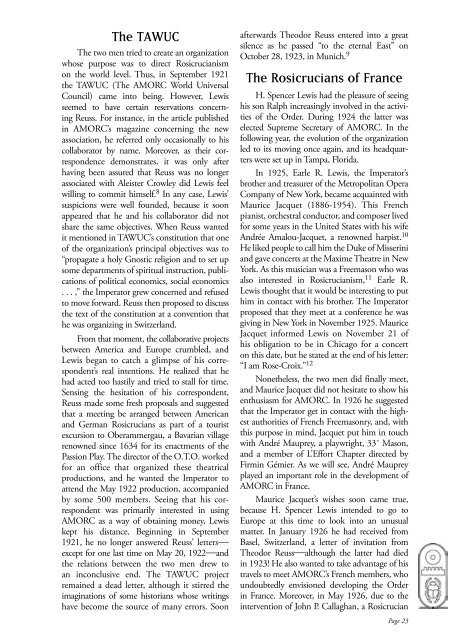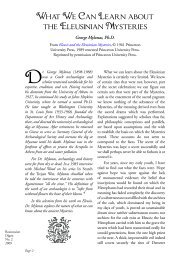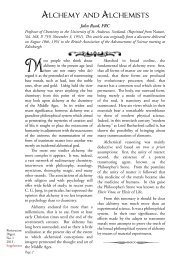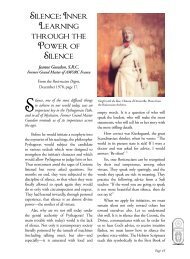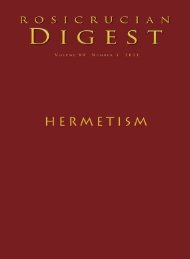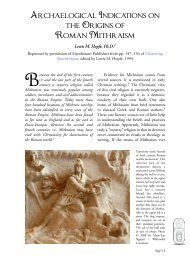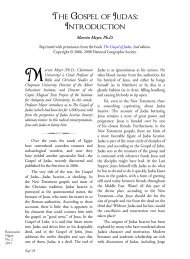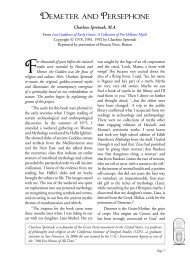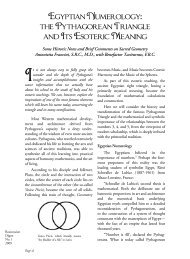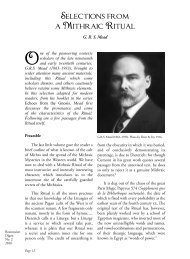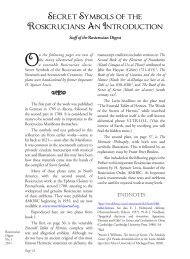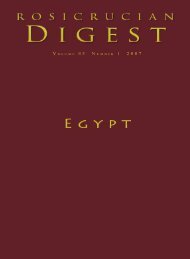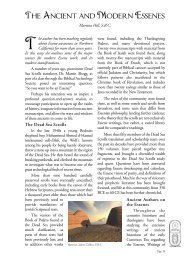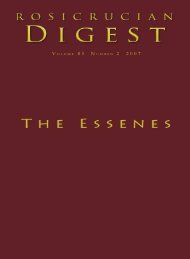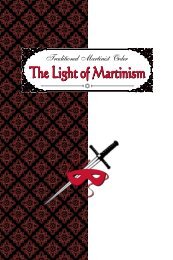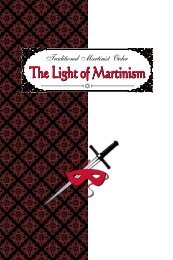The Grand Temple - Rosicrucian Order, AMORC
The Grand Temple - Rosicrucian Order, AMORC
The Grand Temple - Rosicrucian Order, AMORC
You also want an ePaper? Increase the reach of your titles
YUMPU automatically turns print PDFs into web optimized ePapers that Google loves.
<strong>The</strong> two men tried to create an organization<br />
whose purpose was to direct <strong>Rosicrucian</strong>ism<br />
on the world level. Thus, in September 1921<br />
the TAWUC (<strong>The</strong> <strong>AMORC</strong> World Universal<br />
Council) came into being. However, Lewis<br />
seemed to have certain reservations concerning<br />
Reuss. For instance, in the article published<br />
in <strong>AMORC</strong>’s magazine concerning the new<br />
association, he referred only occasionally to his<br />
collaborator by name. Moreover, as their correspondence<br />
demonstrates, it was only after<br />
having been assured that Reuss was no longer<br />
associated with Aleister Crowley did Lewis feel<br />
willing to commit himself. 8 In any case, Lewis’<br />
suspicions were well founded, because it soon<br />
appeared that he and his collaborator did not<br />
share the same objectives. When Reuss wanted<br />
it mentioned in TAWUC’s constitution that one<br />
of the organization’s principal objectives was to<br />
“propagate a holy Gnostic religion and to set up<br />
some departments of spiritual instruction, publications<br />
of political economics, social economics<br />
. . . ,” the Imperator grew concerned and refused<br />
to move forward. Reuss then proposed to discuss<br />
the text of the constitution at a convention that<br />
he was organizing in Switzerland.<br />
From that moment, the collaborative projects<br />
between America and Europe crumbled, and<br />
Lewis began to catch a glimpse of his correspondent’s<br />
real intentions. He realized that he<br />
had acted too hastily and tried to stall for time.<br />
Sensing the hesitation of his correspondent,<br />
Reuss made some fresh proposals and suggested<br />
that a meeting be arranged between American<br />
and German <strong>Rosicrucian</strong>s as part of a tourist<br />
excursion to Oberammergau, a Bavarian village<br />
renowned since 1634 for its enactments of the<br />
Passion Play. <strong>The</strong> director of the O.T.O. worked<br />
for an office that organized these theatrical<br />
productions, and he wanted the Imperator to<br />
attend the May 1922 production, accompanied<br />
by some 500 members. Seeing that his correspondent<br />
was primarily interested in using<br />
<strong>AMORC</strong> as a way of obtaining money, Lewis<br />
kept his distance. Beginning in September<br />
1921, he no longer answered Reuss’ letters<br />
except for one last time on May 20, 1922 and<br />
the relations between the two men drew to<br />
an inconclusive end. <strong>The</strong> TAWUC project<br />
remained a dead letter, although it stirred the<br />
imaginations of some historians whose writings<br />
have become the source of many errors. Soon<br />
afterwards <strong>The</strong>odor Reuss entered into a great<br />
silence as he passed “to the eternal East” on<br />
October 28, 1923, in Munich. 9<br />
H. Spencer Lewis had the pleasure of seeing<br />
his son Ralph increasingly involved in the activities<br />
of the <strong>Order</strong>. During 1924 the latter was<br />
elected Supreme Secretary of <strong>AMORC</strong>. In the<br />
following year, the evolution of the organization<br />
led to its moving once again, and its headquarters<br />
were set up in Tampa, Florida.<br />
In 1925, Earle R. Lewis, the Imperator’s<br />
brother and treasurer of the Metropolitan Opera<br />
Company of New York, became acquainted with<br />
Maurice Jacquet (1886-1954). This French<br />
pianist, orchestral conductor, and composer lived<br />
for some years in the United States with his wife<br />
Andrée Amalou-Jacquet, a renowned harpist. 10<br />
He liked people to call him the Duke of Misserini<br />
and gave concerts at the Maxime <strong>The</strong>atre in New<br />
York. As this musician was a Freemason who was<br />
also interested in <strong>Rosicrucian</strong>ism, 11 Earle R.<br />
Lewis thought that it would be interesting to put<br />
him in contact with his brother. <strong>The</strong> Imperator<br />
proposed that they meet at a conference he was<br />
giving in New York in November 1925. Maurice<br />
Jacquet informed Lewis on November 21 of<br />
his obligation to be in Chicago for a concert<br />
on this date, but he stated at the end of his letter:<br />
“I am Rose-Croix.” 12<br />
Nonetheless, the two men did finally meet,<br />
and Maurice Jacquet did not hesitate to show his<br />
enthusiasm for <strong>AMORC</strong>. In 1926 he suggested<br />
that the Imperator get in contact with the highest<br />
authorities of French Freemasonry, and, with<br />
this purpose in mind, Jacquet put him in touch<br />
with André Mauprey, a playwright, 33˚ Mason,<br />
and a member of L’Effort Chapter directed by<br />
Firmin Gémier. As we will see, André Mauprey<br />
played an important role in the development of<br />
<strong>AMORC</strong> in France.<br />
Maurice Jacquet’s wishes soon came true,<br />
because H. Spencer Lewis intended to go to<br />
Europe at this time to look into an unusual<br />
matter. In January 1926 he had received from<br />
Basel, Switzerland, a letter of invitation from<br />
<strong>The</strong>odor Reuss although the latter had died<br />
in 1923! He also wanted to take advantage of his<br />
travels to meet <strong>AMORC</strong>’s French members, who<br />
undoubtedly envisioned developing the <strong>Order</strong><br />
in France. Moreover, in May 1926, due to the<br />
intervention of John P. Callaghan, a <strong>Rosicrucian</strong><br />
Page 23


